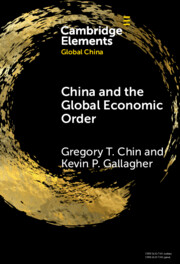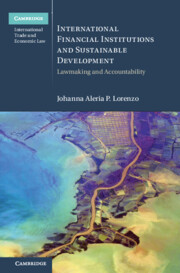Refine search
Actions for selected content:
106 results
Riots could be expected: Toward a global history of protest and reaction at the World Bank
-
- Journal:
- Journal of Global History , First View
- Published online by Cambridge University Press:
- 30 October 2025, pp. 1-22
-
- Article
-
- You have access
- Open access
- HTML
- Export citation

China and the Global Economic Order
-
- Published online:
- 10 October 2025
- Print publication:
- 30 November 2025
-
- Element
-
- You have access
- Open access
- HTML
- Export citation
Argentina’s creditworthiness achievements and problems, 1955–1962: the role of institutions, policymakers, and external agents
-
- Journal:
- Revista de Historia Economica - Journal of Iberian and Latin American Economic History , First View
- Published online by Cambridge University Press:
- 12 September 2025, pp. 1-21
-
- Article
- Export citation
7 - The Economics of Climate Change
-
- Book:
- From Crisis to Action
- Published online:
- 15 August 2025
- Print publication:
- 04 September 2025, pp 143-175
-
- Chapter
-
- You have access
- Open access
- HTML
- Export citation
The scope of accountability of international organisations: the relevance of power, institutional structure, and salience
-
- Journal:
- International Theory , First View
- Published online by Cambridge University Press:
- 22 August 2025, pp. 1-26
-
- Article
-
- You have access
- Open access
- HTML
- Export citation
The ‘political indifference’ of the World Bank: the case of Brazil, 1948‒1988
-
- Journal:
- Financial History Review / Volume 32 / Issue 1 / April 2025
- Published online by Cambridge University Press:
- 21 July 2025, pp. 82-106
-
- Article
-
- You have access
- Open access
- HTML
- Export citation

International Financial Institutions and Sustainable Development
- Lawmaking and Accountability
-
- Published online:
- 09 June 2025
- Print publication:
- 26 June 2025
12 - ‘The Critic Is Not the One Who Debunks, but the One Who Assembles’
- from People, Practices, and Performance
-
-
- Book:
- Ways of Seeing International Organisations
- Published online:
- 17 April 2025
- Print publication:
- 24 April 2025, pp 227-246
-
- Chapter
-
- You have access
- Open access
- HTML
- Export citation
Reassessing World Bank conditionality: beyond count measures
-
- Journal:
- Political Science Research and Methods , First View
- Published online by Cambridge University Press:
- 14 April 2025, pp. 1-21
-
- Article
-
- You have access
- Open access
- HTML
- Export citation
7 - Liberalisation and the ‘Social Safety Net’
- from Part III - Liberalisation and Welfare in a Multi-level Democracy
-
- Book:
- Making India Work
- Published online:
- 13 February 2025
- Print publication:
- 13 February 2025, pp 151-172
-
- Chapter
- Export citation
3 - The Big Picture: Large-n Evidence
-
- Book:
- The Financial Statecraft of Borrowers
- Published online:
- 12 December 2024
- Print publication:
- 19 December 2024, pp 69-135
-
- Chapter
- Export citation
5 - Ethiopia: Successful Financial Statecraft
-
- Book:
- The Financial Statecraft of Borrowers
- Published online:
- 12 December 2024
- Print publication:
- 19 December 2024, pp 159-198
-
- Chapter
- Export citation
Do the Bretton Woods Institutions promote economic transparency?
-
- Journal:
- Political Science Research and Methods / Volume 13 / Issue 2 / April 2025
- Published online by Cambridge University Press:
- 24 October 2024, pp. 354-372
-
- Article
-
- You have access
- Open access
- HTML
- Export citation
Chapter 22 - Global economic institutions
- from Part 4 - The new agenda: Globalisation and global challenges
-
-
- Book:
- An Introduction to International Relations
- Published online:
- 31 August 2024
- Print publication:
- 12 August 2024, pp 296-308
-
- Chapter
- Export citation
3 - Pharaonic Environmentalism
-
- Book:
- Hydropower in Authoritarian Brazil
- Published online:
- 09 July 2024
- Print publication:
- 27 June 2024, pp 86-124
-
- Chapter
- Export citation
7 - Advancing Rights through an Accountability Norm?
- from Part II - Development of the Field
-
-
- Book:
- Contesting the World
- Published online:
- 01 November 2024
- Print publication:
- 06 June 2024, pp 115-130
-
- Chapter
- Export citation
6 - The International Monetary Fund and the World Bank
-
- Book:
- International Organizations
- Published online:
- 17 May 2024
- Print publication:
- 06 June 2024, pp 129-158
-
- Chapter
- Export citation
3 - The Mutual Shaping of Measures and Concepts
- from Part I - Laying the Groundwork
-
- Book:
- Rethinking Corruption
- Published online:
- 27 February 2024
- Print publication:
- 22 February 2024, pp 32-51
-
- Chapter
- Export citation
9 - How the World Bank’s Dispute Resolution Services Should Benefit Affected Persons and Borrower States
- from Part III - Trade, Finance and Investment
-
-
- Book:
- International Courts versus Non-Compliance Mechanisms
- Published online:
- 15 February 2024
- Print publication:
- 22 February 2024, pp 187-216
-
- Chapter
-
- You have access
- Open access
- HTML
- Export citation
3 - Building Effective Philanthropy through Strategic Partnerships
-
-
- Book:
- Reimagining Philanthropy in the Global South
- Published online:
- 09 February 2024
- Print publication:
- 15 February 2024, pp 58-84
-
- Chapter
-
- You have access
- Open access
- HTML
- Export citation
